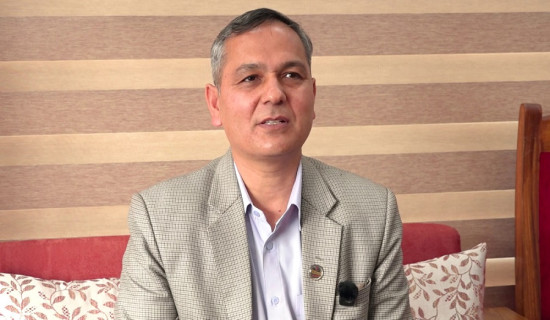- Wednesday, 4 March 2026
AI’s Revolution In Film Editing
Storytelling and human experience are at the core of what editors do, and nowhere are these elements more present than in the field of film editing. At their heart, films are stories about people, their struggles, and their outer transformation. Crafting a compelling narrative on a timeline requires a deep understanding of story structure, pacing, and the filmmaking process. Editing is the backbone of filmmaking and some percent of directing because the editor is recreating and rewriting the post. A well-edited film can elevate the story, pacing, mood, performance, and themes.
In the early days of film, editing was a manual process involving physical film reels. After the decade of 2000, editing underwent a digital transformation. The digital transformation in Nepal started in 2007 with the Kagbeni movie. Released in 2008, Kagbeni is Nepal's first digital film, which was shot by a camera that was not fully functional. It became a great opportunity for creative professionals, including directors, actors, cinematographers, and editors, to experiment with digital transformation. Digital cameras revolutionised the film industry by making hard drive storage and digital editing possible for feature films. Software such as Adobe Premiere, Final Cut, and Avid allows editors to easily rearrange scenes for nonlinear editing. Software has come a long way to help with editing such as cuts, transitions, and colour correction.
Now, after 2020, another digital revolution is taking place, which is rapidly increasing as it can do the entire work of filmmaking itself. Some critics have started saying that there will be no need to shoot movies within a few years. All created by artificial intelligence. Art, scenery, characters, editing, colour grading, everything—even the film itself—is made by AI. Film director Pranab Joshi is working on AI and experiencing its innovations in every dimension. He says, "The introduction of AI in the film industry marks a significant shift, showcasing glimpses of it's potential through tools. Innovations such as video editing tools' new updates and the emergence of tools that can translate videos into any language hint at a transformative future where entire movies can be created from the comfort of a room without the need for traditional cameras."
The AI industry, already valued at 136.6 billion dollars, is reshaping the filmmaking experience across different stages, from pre-production to post-production. AI's capacity to analyse vast datasets can provide valuable insights and generate stunning graphics, transporting audiences to imaginative realms. Moreover, AI assists in creative processes, offering ideas, character development, dialogue improvement, and content refinement. So, it has already begun to impact filmmaking and editing. There are three huge benefits to editing. One is reducing the amount of time spent on editing. Another one is the ability to make micro-adjustments that might be difficult for a human. And another one is that AI can act as an assistant editor, allowing editors to focus on more creative tasks. Among the editing tools in Premiere, the Auto Reframe tool automatically identifies focal points within a frame and adjusts aspect ratios to suit different platforms, making it especially useful for filmmakers who want to produce trailers for social media. Similarly, Speech to Text offers AI transcription services, converting spoken dialogue into text subtitles. However, the Colour Match tool matches colour grades between different shots, helping to maintain consistent looks throughout their project. In addition, AI removes unwanted objects from clips, analyses audio tracks, and balances the mix. AI allows you to create complete videos from text descriptions. As we describe a scene, this tool will create a video of it on the spot. Filmmaker Joshi says, "The efficiency gains are further extended to film editing, with AI tools streamlining processes and enhancing footage quality. As the industry witnesses the continuous influx of new AI tools, the trajectory suggests that AI will become ubiquitous, revolutionising various aspects of filmmaking. While these advancements bring forth exciting possibilities, they also raise concerns about potential job displacement and the impact on traditional filmmaking practices."
However, editing is not just about cutting clips together; it’s a deep art of the story’s timing, mood, and emotion understanding. Editor’s choices are at the foundation of craft. Turning raw footage into a narrative of the editor’s decisions, each of which has the potential to impact the pace, sequence, and tone of the story. Film editing is as much about storytelling as it is about technical skills. Editors understand the feelings between characters through precise timing. This requires a level of understanding of human behaviour that AI has yet to reach. Many professionals say that AI-generated results are a good starting point, but additional editor input is usually needed for the final touches. The role of AI in editing is that it acts as an advanced tool that can handle the more monotonous aspects of the job, freeing editors to focus on creative decisions. This could be useful for dialogue editing or temporary voice-over work before final recording.
The BFI London Film Festival in London had an 'I AM NOT A ROBOT' session about generative AI in the screen industries, organised in collaboration with Screen International. In the session, Tim Weber, CEO of UK-based animation and visual effects company Framestore, says, "Generative AI is not as effective as first thought. It's neither as revelatory and amazing as we all thought it might be in the early days, nor is it as scary as we all thought it might be in the early days. We're crossing somewhere in the middle."
Also on the panel was Sami Arpa, CEO of Swiss-based AI company Largo, who unveiled a new AI storyboarding tool that allows for more ‘style consistent" creations. "While traditional storyboarding often relies on generic images and is a time-consuming process, the new AI tool uses highly specialised production to create specific styles. Production companies can now benefit from the power of AI-assisted storyboarding, making the creative process more efficient and accessible," Arpa says.
In my opinion, AI may devalue the art of storyboarding and editing in film, although it seems unlikely that AI will overtake creative and intelligent humans. Technology has not reached the point where it can replicate the artistry and creative intuition that humans bring. But now the debate is going on about whether the film will be made by AI. Artists will do it all with AI. If so, what about human emotions? What about human expression? Could it represent humans' inner feelings, ethical reflections, and cultural nuances? Could it make a moral impression? These questions help us think more deeply about the role and value of human creativity in an increasingly automated world. Theatre artist, film director, and writer Kedar Shrestha says, "I don't believe that AI will make movies and create emotions and thoughts." The Oscar-winning visual effects supervisor Tim Weber at the BFI’s industry panel says, ‘Using generative AI for video is much more difficult than for images. The big issue is temporal stability. Getting and controlling the style you want is one of the hardest things. They're not very directed. They're not very controlled." He added, “Actors are not hired for their faces. We are recruiting actors based on their performance, their personalities, and what they bring in terms of character. We create a lot of characters, but bringing that character to life and getting someone to carry the film is a completely different challenge.”
Aside from these challenges, AI might introduce unemployment and dwindling opportunities for emerging professionals in the creative journey. Art captures the inner feelings, ethical reflections, cultural nuances, and other subtleties of the creator, but automation might streamline the process of filmmaking and reduce costs as well as the emotional richness of the outcome. Technology and art never stand still. What is AI capable of doing today, and what can it do tomorrow? None of us can say.
(The author is a film editor.)

















